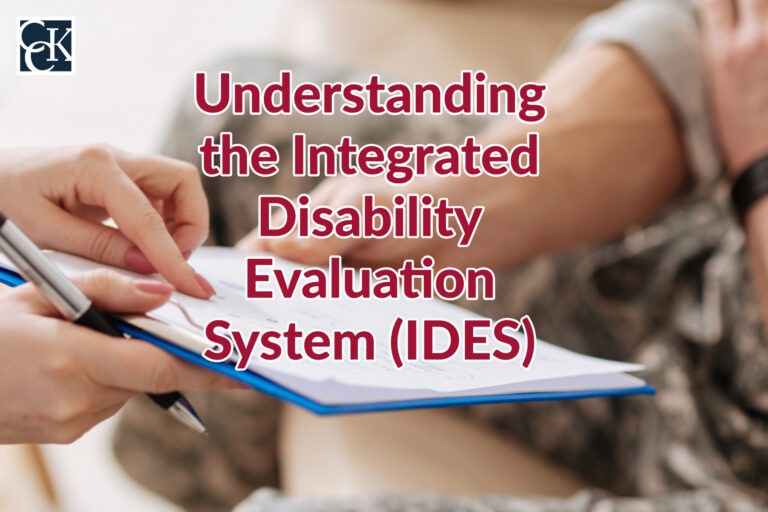Understanding the Integrated Disability Evaluation System (IDES)

CCK Law: Our Vital Role in Veterans Law
What Is the Integrated Disability Evaluation System (IDES)?
The Integrated Disability Evaluation System (IDES) is a disability evaluation process run jointly by the United States Department of Defense (DoD) and the United States Department of Veterans Affairs (VA). The DoD developed the IDES in 2009 to streamline the disability assessment process across VA and DoD.
When a service member is wounded, injured, or develops an illness during military service, they are referred to the IDES. Through this system, VA works with the DoD to determine if the service member is fit to continue their active duty. If the service member is found to be medically unfit for duty due to their injury or illness, IDES will propose a VA disability rating for the service member to be assigned after separation from service.
Importantly, IDES participants do not apply to participate in IDES. They are referred by their branch of service, and then assigned a Physical Evaluation Board Liaison Officer (PEBLO) and a Military Services Coordinator (MSC). Service members who participate in IDES can, however, file a VA claim for disability benefits through their MSC.
Integrated Disability Evaluation System (IDES) Timeline Overview
The Integrated Disability Evaluation System (IDES) process consists of four main stages: the Medical Evaluation Board (MEB), the Physical Evaluation Board (PEB), transition, and VA disability compensation delivery.
Note: The timeframes listed below are estimated goals by the IDES, outlined in 2018. The IDES process may be longer or shorter depending on each specific case.
Medical Evaluation Board (MEB)
The MEB, which typically takes about 72 days, is the medical phase of the IDES process. At this point, the service member is assigned a Physical Evaluation Board Liaison Office (PEBLO) and a Military Services Coordinator (MSC).
The PEBLO serves as a case manager for DoD, while also educating the service member on the IDES process and answering any questions. On the other hand, the MSC manages the service member’s case on behalf of VA, helps the service member submit a VA disability claim, and schedules any necessary VA compensation and pension (C&P) exams. While the PEBLO focuses primarily on the service member’s IDES condition, the MSC seeks to identify all possible service-related medical conditions.
The steps of the MEB process are as follows:
- Referral – First, a physician will treat and assess the service member’s condition(s) to determine if they meet the requirements for the Medical Retention Determination Point (MRDP). Essentially, if a service member’s condition seems to have stabilized, further recovery is relatively predictable, and they are most likely not capable of continuing their military duties within 12 months of onset, they will be referred to the MEB for review.
- Claim development – In this step, the MSC helps the service member submit a VA claim.
- C&P exams – The service member attends any scheduled C&P exams.
- MEB review – Following C&P examinations, the results of the exams are sent to the PEBLO, and the service member’s physician writes a “Narrative Summary” report, also known as a NARSUM. The NARSUM is then submitted to the Medical Evaluation Board. The MEB will review the service member’s NARSUM and other documents in their case file, including medical treatment records, C&P exam results, and letters from military officials that detail how the service member’s condition affects their duties. The MEB will determine the “medical acceptability” (i.e., if they meet the military’s standards of medical fitness) of each condition.
- MEB Rebuttal/Impartial Medical Review (if applicable) – If the MEB decides a service member is fit for duty, they have the option to appeal the decision. The service member can request that an impartial physician review their case file.
If MEB determines that the service member is unfit for duty, the determinations are forwarded to the next stage of the process, the Physical Evaluation Board (PEB).
Physical Evaluation Board (PEB)
Once the PEB receives the MEB decision, the PEB process begins. The PEB, which lasts about 82 days, evaluates the service member’s service-connected condition(s) to determine which makes them unfit for duty. This process is critical to deciding eligibility for DoD disability benefits.
The PEB process is split into two main stages – the Informal PEB and the Formal PEB:
- Informal PEB (IPEB) – At least two officers will examine several factors, including the NARSUM, treatment records, and other relevant documents. If the IPEB determines that the service member is unfit for duty, the case is forwarded to VA.
- Proposed ratings – VA will propose disability ratings for each service-connected condition.
- IPEB proposed decision – The PEB uses VA’s ratings for the ‘unfit for duty’ conditions as ratings for DoD disability.
- Elections – The PEBLO and service member review the IPEB proposed decision, and the service member can decide if they accept the proposal or would like to request a Formal PEB.
- Formal PEB (FPEB) – The FPEB will review the service member’s case and make a final decision.
- FPEB Appeal – If the service member disagrees with the FPEB decision, they can appeal to the appellate review authority within the military department.
- VA Rating Reconsideration – If the service member disagrees with VA’s rating decision, they can submit for reconsideration.
The FPEB will finalize its decision, apply VA’s ratings, and end the DoD portion of the IDES process.
Transition and VA Disability Compensation Delivery
If found unfit for active duty, the service member will then transition out of military service. The service member is required to separate no later than 90 days following board finalization.
About 30 days after the service member departs military service, VA will officially publish its rating decision letter and the IDES system ends.
How CCK Helps Disabled Veterans
If VA denied you disability compensation or assigned you an inaccurate rating, the accredited attorneys and claims agents at Chisholm Chisholm & Kilpatrick LTD may be able to assist you with the appeals process. CCK has decades of experience successfully representing veterans and their families before VA, the Board of Veterans’ Appeals, and the Court of Appeals for Veterans Claims (CAVC).
To schedule your complimentary case review, reach out to CCK today at 800-544-9144.
About the Author
Share this Post
